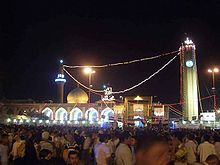- Islam in Iraq
-
Part of a series on
Islam by countryThe AmericasThe history of Islam in Iraq goes back almost 1,400 years to the lifetime of Muhammad (died 632).
Islam in Iraq
Iraq's Muslims follow two distinct traditions, Shia and Sunni Islam. According to the Encyclopedia Britannica, Iraq is 97% Muslim: 65% Shi'a, 35% Sunni. Iraq is home to many religious sites important for both Shia and Sunni Muslims. Baghdad was a hub of Islamic learning and scholarship for centuries and served as the capital of the Abassids. The city of Karbala has substantial prominence in Shia Islam as a result of the Battle of Karbala, fought on the site of the modern city on October 10, 680. Similarly, Najaf is renowned as the site of the tomb of Alī ibn Abī Tālib (also known as "Imām Alī"), whom the Shia consider to be the righteous caliph and first imām. The city is now a great center of pilgrimage from throughout the Shi'a Islamic world and it is estimated that only Mecca and Medina receive more Muslim pilgrims. The city of Kufa was home to the famed scholar, Abu Hanifah whose school of thought is followed by a sizable number of Sunni Muslims across the globe. Likewise, Samarra is also home to the al-Askari Mosque, containing the mausoleums of the Ali al-Hadi and Hasan al-Askari, the tenth and eleventh Shia Imams, respectively, as well as the shrine of Muhammad al-Mahdi, known as the "Hidden Imam", who is the twelfth and final Imam of the Shia of the Ja'farī Madhhab. This has made it an important pilgrimage centre for Ja'farī Shia Muslims. In addition, some female relatives of the Prophet Mohammad are buried in Samarra, making the city one of the most significant sites of worship for Shia and a venerated location for Sunni Muslims.
Smaller sects of Islam exist in the country, such as the small Shaykhist community concentrated in Basra and Karbala. The Muslim population of Iraq is approximately 60-65 percent Arab Shi'a, 15-20 percent Arab Sunni and 17 percent Kurdish.[1] Iraqi Kurds are mostly Sunni, with about 10% being Shi'a Faili Kurds. Most Kurds are located in the northern areas of the country, with most following the Shafi school of Islamic law and being members of either the Qadiri or the Naqshbandi Sufi tariqah.
Further information: Demographics of IraqShi'a Islam
Main article: Shia Islam in IraqNotes
- ^ John Esposito, The Oxford Dictionary of Islam, Oxford University Press 2003
Islam in Asia Sovereign
states- Afghanistan
- Armenia
- Azerbaijan
- Bahrain
- Bangladesh
- Bhutan
- Brunei
- Burma (Myanmar)
- Cambodia
- People's Republic of China
- Cyprus
- East Timor (Timor-Leste)
- Egypt
- Georgia
- India
- Indonesia
- Iran
- Iraq
- Israel
- Japan
- Jordan
- Kazakhstan
- North Korea
- South Korea
- Kuwait
- Kyrgyzstan
- Laos
- Lebanon
- Malaysia
- Maldives
- Mongolia
- Nepal
- Oman
- Pakistan
- Philippines
- Qatar
- Russia
- Saudi Arabia
- Singapore
- Sri Lanka
- Syria
- Tajikistan
- Thailand
- Turkey
- Turkmenistan
- United Arab Emirates
- Uzbekistan
- Vietnam
- Yemen
States with limited
recognition- Abkhazia
- Nagorno-Karabakh
- Northern Cyprus
- Palestine
- Republic of China (Taiwan)
- South Ossetia
Dependencies and
other territories- Christmas Island
- Cocos (Keeling) Islands
- Hong Kong
- Macau
Categories:
Wikimedia Foundation. 2010.

